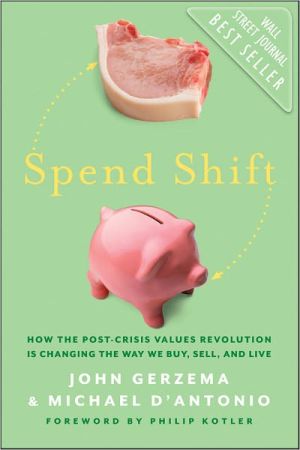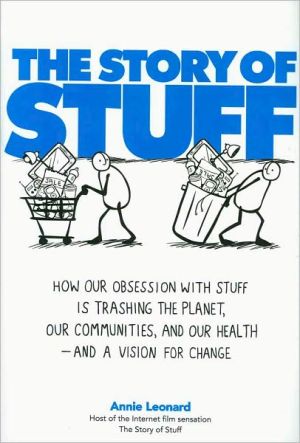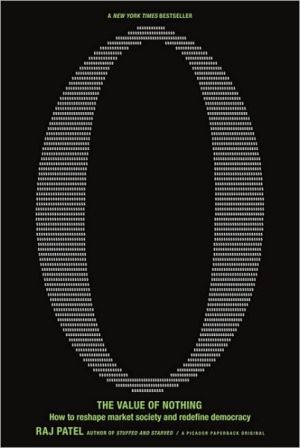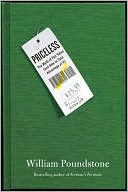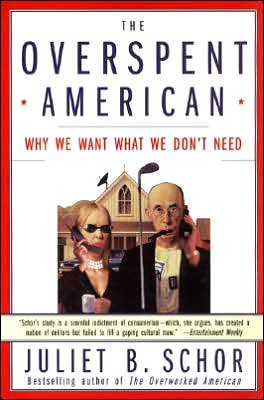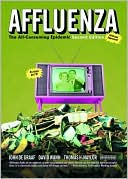Spend Shift: How the Post-Crisis Values Revolution Is Changing the Way We Buy, Sell, and Live
What do old-fashioned virtues tell you about the new economy? A social theorist and expert on consumerism and a Pulitzer Prize-winning reporter hit the road to examine life after the Great Recession. What they uncovered will tell you everything you'll need to know to survive and thrive.\ "Spend Shift is a must-read for anyone who wants to understand how to cope withthe ongoing economic crisis. Armed with reams of data as well as compelling stories,John Gerzema and Michael D'Antonio show how...
Search in google:
New spending patterns reveal how massive cultural value shifts can be recognized in today's consumer behavior and are remaking capitalism for the better.In Spend Shift, John Gerzema, best-selling authorand expert on consumerism, and Pulitzer Prize– winning writer Michael D'Antonio travel acrossAmerica to document a renewal of hope andenterprise in the post-recession economy. Guidedby exclusive data from Young & Rubicam's vastsurveys of public attitudes, the authors find thathipsters in Brooklyn, entrepreneurs in Tampa, and veterans in Northern California are all returning to age-old values such as self-reliance, faith, and thrift to redefine the "good life." These value shifts can be seen in consumers as mindless consumption becomes mindful. Through focused spending, consumers are influencing a myriad of companies and hoping to make the world a little better with each purchase.Packed with insights from global leaders in market psychology and communication, Spend Shift also features interviews with business leaders from over fifty companies who understand the changes now under way. At companies like Zappos, Ford, Etsy, SunRun, and RecycleBank, to name just a few, the authors find executives who are harnessing new technologies and old-fashioned customer-first practices to make their companies more relevant, more resilient, and more profitable. These examples, and many others, show that while the consumer psyche is changing even faster than the economy, companies can adapt and thrive. In the process, they may also feel a lot better about their impact on the communities they serve and on the planet they share with their customers.Compelling and insightful, Spend Shift is essential reading for anyone interested in how societal values are changing and how businesses can connect with customers who vote with their dollars, every day.
Foreword Philip Kotler Kotler, PhilipIntroduction: Numbers and Their Meaning: Kansas City, Missouri1 The New American Frontier: Detroit, Michigan 12 Don't Fence Me In: Dallas, Texas 283 The Badge of Awesomeness: Boston, Massachusetts 534 An Army of Davids: Tampa, Florida 785 Block Party Capitalism: Brooklyn, New York 1036 The Quality of the Lion: Las Vegas, Nevada 1287 The Citizen Corporation: Dearborn, Michigan 1578 Innovation Nation: San Francisco, California 182Coda: The Takeaway: Los Angeles, California 205Suggested Reading 227Acknowledgments 229Notes 231About the Authors 241Index 243
\ Publishers WeeklyA much-needed optimistic yet realistic look at how the recession might be prompting behaviors that will change our society for the better. America, argue the authors, is undergoing a radical but positive shift in consumer values, away from the buying frenzy of the last few decades. Tracking purchasing and social attitudes in the U.S., Gerzema (The Brand Bubble) and D'Antonio (Hershey) observe that the recession has encouraged a resurgence of old-fashioned values--self-reliance, hard work, thrift, and community service. They present studies of such salutary developments as neighborhood revitalization in Detroit, job training in suburban Dallas, and increasing entrepreneurship in Brooklyn. According to the authors, as people adapt to the crisis by seeking greater balance and more fulfilling daily lives, they're more likely to shift to supporting local businesses (ensuring tax dollars stay in their own communities), learning traditional DIY skills, and paying attention to the ethical and environmental practices of the companies to whom they give money. (Oct.)\ \
